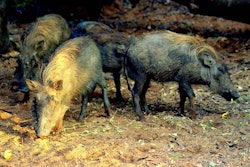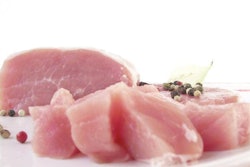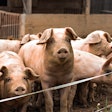
Initial trial sees success, but more work necessary before ASF vaccine can be sold commercially
An experimental new vaccine for African swine fever (ASF) has prevented the virus from killing pigs in an early trial, but researchers say it could still be several years before the vaccine is available for commercial use.
According to a May report in the journal Vaccines, eight pigs received an experimental vaccine developed by researchers at The Pirbright Institute in the U.K. Although all eight pigs became ill after being exposed to the ASF virus, none of the pigs ultimately died from the disease, suggesting the vaccine lessened the severity of the disease.
“We definitely need more work. Although all the pigs survived after they were given the dose of ASF, they did all get sick, so that’s not a perfect vaccine,” said Christopher Netherton, who heads the ASF vaccinology group. “What we want is for them to have no clinical results at all.
Researchers in the U.S. and in China are also making progress toward a vaccine for ASF, but Pirbright is attempting a slightly different technique. Other research efforts have primarily focused on developing an attenuated vaccine for ASF by deleting the ports of the virus that trigger disease. The weakened virus is injected into pigs with the intent of triggering an immune response, without causing illness.
Using this technique to combat ASF has proven challenging in the past, because the virus in the vaccine reverted to a disease-causing form and became contagious, spreading a chronic but less severe form of ASF. It’s also difficult to distinguish pigs who received an attenuated vaccine from pigs that contracted ASF naturally, which could have important implications for countries trying to restore trade after an outbreak.
So Pirbright, Netherton said, is working with another technology. Rather than deleting genes from the ASF virus, Pirbright researchers have identified eight critical ASF genes they are removing from the disease-causing virus, and implanting a harmless virus that is then injected as a vaccine in hope of triggering an immune response against ASF without actually exposing pigs to the disease itself.
The commercial availability of such a vaccine is likely years away, Netherton said. Not only did the pigs in the trial become ill — a common problem with vaccines of this nature — but the trial was too small and too short to determine the long-term efficacy and safety of the vaccine.
The attenuated vaccine may be the first option available commercially if researchers in China or the U.S. can overcome the safety concerns that have plagued attempts to create an attenuated vaccine for ASF in the past.
“I think both the Chinese and Plum Island vaccines, the live attenuated vaccines, are well ahead,” Netherton said. “They have better efficacy. The issue will be safety; whether they are truly attenuated.”
View our continuing coverage of the African swine fever outbreak.


















